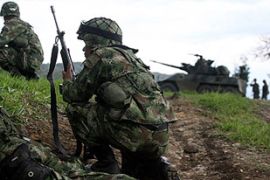Venezuela cuts ties with Colombia
Move follows charges by Bogota that Venezuela is harbouring Colombian guerrilla leaders.

Earlier, Colombia’s foreign ministry had said that Maria Luisa Chiappe, its ambassador to Caracas, Venezuela’s capital, would be called back to Bogota “to evaluate the situation”.
At an emergency meeting of the Washington-based Organisation of American States (OAS), Luis Alfonso Hoyos, a Colombian diplomat, presented evidence that he said suggests Venezuela was harbouring Revolutionary Armed Forces of Colombia (Farc) rebels.
Killings and kidnappings
Hoyos accused Chavez’s government of tolerating the rebels who he said carried out killings, kidnappings and drug-trafficking on both sides of the long frontier.
“The continent cannot allow this nightmare to spread,” Hoyos said.
But Roy Chaderton, Venezuela’s ambassador, rejected the Colombian presentation as a “lie”, saying: “There is no evidence, no proof, these are photos taken I don’t know where.”
Hoyos went on to show a series of photos and videos of alleged Farc leaders and guerrillas relaxing, roasting pigs and playing a piano at camps he said were well inside Venezuela.
|
“Given the past history on this issue, the most likely outcome is going to be stonewalling, postponement, setting up a committee to investigate the matter,” Larry Burns, director of the Council on Hemispheric Affairs, Washington |
“Facts over recent weeks show that real risks are materialising due to the consolidated, active and growing presence of these terrorist groups in Venezuela,” Hoyos said.
He added that the Venezuelan authorities “tolerate the presence of these groups, they don’t carry out actions against them”.
Sometimes the rebels are even accompanied by members of Venezuela’s National Guard, Hoyos added.
Farc rebels carried out cross-border attacks from Venezuela as recently as June and July, Hoyos said as he showed photographs of civilian and military victims of these attacks.
The ambassador’s remarks came a week after Alvaro Uribe, Colombia’s outgoing president who leaves office in August, said his government had evidence that five leaders of leftist guerrilla groups were in Venezuela.
Uribe’s office is contending the rebel leaders in Venezuela include four senior members of Farc and one from the smaller National Liberation Army (ELN).
Both rebel movements have been waging an armed campaign against the Colombian government since the mid-1960s.
Larry Burns, director of the Council on Hemispheric Affairs in Washington, told Al Jazeera that “some people believe [Alvaro] Uribe wants to shape the future of Colombia’s foreign policy and maintain a policy of hositility towards Venezuela”.
Uribe accusations
“Uribe is the one who disclosed and made the accusation that Venezuelans have taken in Farc guerrillas and have provided them with hospitality. The incoming president [Juan Manuel Santos] hasn’t made those charges,” he said.
Burns added that it was “unlikely” that the OAS would take any decisive action on the matter.
“There are a number of countries in the OAS who are very favourable to Hugo Chavez and that includes Argentina, which is a very important country in Latin America,” he said.
“Given the past history on this issue, the most likely outcome is going to be stonewalling, postponement, setting up a committee to investigate the matter, but there’s going to be an effort to shun any clear confrontation because of the fact that the evidence is questionable and the motivation is even more questionable.”
Colombia and Venezuela cut diplomatic ties last year after Bogota and the US signed a military co-operation agreement that Chavez considered a threat to regional security.
Chavez has accused Uribe of trying to thwart a normalisation of relations when the Colombian leader leaves office August 7.
Uribe, who has had tense relations with his Venezuelan counterpart, will be succeeded by Juan Manuel Santos, his former defence minister, who has signalled a less hostile approach to Venezuela.